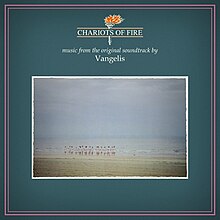
Chariots of Fire is a 1981 British historical sports drama film directed by Hugh Hudson, written by Colin Welland and produced by David Puttnam. It is based on the true story of two British athletes in the 1924 Olympics: Eric Liddell, a devout Scottish Christian who runs for the glory of God, and Harold Abrahams, an English Jew who runs to overcome prejudice. Ben Cross and Ian Charleson star as Abrahams and Liddell, alongside Nigel Havers, Ian Holm, John Gielgud, Lindsay Anderson, Cheryl Campbell, Alice Krige, Brad Davis and Dennis Christopher in supporting roles. Kenneth Branagh makes his debut in a minor role.

Evangelos Odysseas Papathanassiou, known professionally as Vangelis, was a Greek keyboardist, composer, and producer of electronic, progressive, ambient, and classical orchestral music. He composed the Academy Award-winning score to Chariots of Fire (1981), as well as for the films Blade Runner (1982), Missing (1982), Antarctica (1983), The Bounty (1984), 1492: Conquest of Paradise (1992), and Alexander (2004), and the 1980 PBS documentary series Cosmos: A Personal Voyage by Carl Sagan.
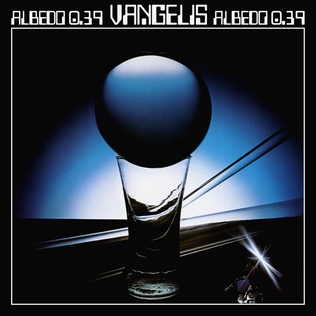
Albedo 0.39 is a studio album by the Greek electronic composer Vangelis, released in 1976. It was the second album produced by Vangelis in Nemo Studios, London, which was his creative base until the late 1980s. It contrasts with his previous album, Heaven and Hell, which was classically inspired and choral, while Albedo 0.39 has blues and jazz overtones. It was his first Top 20 UK album.

Heaven and Hell is a studio album by Greek electronic composer Vangelis, released in November 1975 on RCA Records. It is the first album recorded at his Nemo Studios in London that he used until 1987. It is a concept album based on duality.
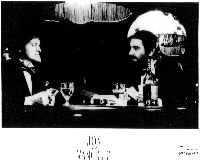
Jon and Vangelis was a music collaboration between British rock singer Jon Anderson and Greek synthesiser musician Vangelis. The duo released four albums between 1980 and 1991.
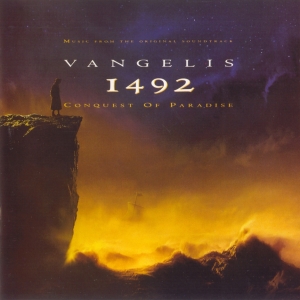
1492: Conquest of Paradise is a 1992 music score to the film of the same name by Greek electronic composer and artist Vangelis. The film, a recount of the voyage to America in 1492 by Christopher Columbus, was directed by Ridley Scott, for whom Vangelis had previously composed the music score for Blade Runner, in 1982. The album and the single "Conquest of Paradise" enjoyed a revival in 1995 for various reasons and broke many sales records.

Spiral is a studio album by the Greek electronic composer Vangelis, released in December 1977. It was the third album produced by Vangelis in Nemo Studios, London, which was his creative base until the late 1980s. For the track "To the Unknown Man" Vangelis received the Midem International Instrumental award in 1978.

Opéra Sauvage is a soundtrack album by the Greek electronic composer Vangelis, released in 1979. It is the score for the nature documentary of the same title by French filmmaker Frédéric Rossif. It is considered one of Vangelis' best albums and is his second most successful album in the USA, reaching #42 in the album charts.
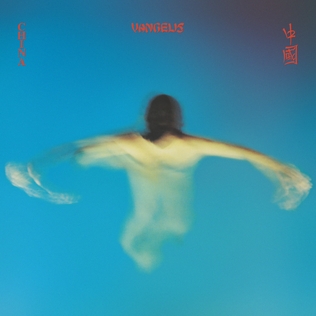
China is a studio album by the Greek electronic composer Vangelis, released in April 1979. Although he had never been to China, he employed Chinese instruments and compositional styles on this concept album. It was thematically ahead of its time as the eastern cultural concepts were mostly unknown to the western audiences. The album received some critical praise. It was certified silver (1985) for sales of over 60,000 copies by BPI.

Themes is a compilation album of works by Greek electronic composer and artist Vangelis released in July 1989. It featured some previously released tracks from Vangelis's other albums, as well as some pieces from movie soundtracks that had not previously been released.

Blade Runner: Original Motion Picture Soundtrack is the soundtrack for Ridley Scott's 1982 science-fiction noir film Blade Runner, composed by Greek electronic musician Vangelis. It has received acclaim as an influential work in the history of electronic music and one of Vangelis's best works. It was nominated in 1983 for a BAFTA and Golden Globe for best original score. The score evokes the film's bleak futurism with an emotive synthesizer-based sound, drawing on the jazz scores of classic film noir as well as Middle Eastern texture and neo-classical elements.
Mythodea — Music for the NASA Mission: 2001 Mars Odyssey is a choral symphony by Greek electronic composer and artist Vangelis. It premiered as a single concert in Athens, Greece, in 1993 but a recording was only released in 2001 by Vangelis' then new record label Sony Classical, which also set up the NASA connection and promoted a new concert, this time with a worldwide audience.

"Chariots of Fire" is an instrumental theme written and recorded by Vangelis for the soundtrack of the 1981 film of the same name. It has been covered by numerous performers and used for various television programs and sporting events.

Alexander is the original film score of the film Alexander (2004), scored by Greek electronic composer Vangelis. It received the Public Choice Award at the 2005 World Soundtrack Academy.
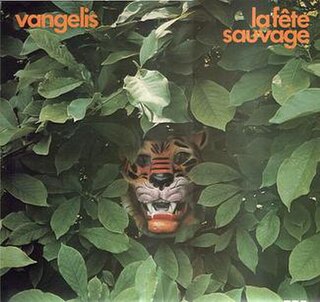
La Fête sauvage is an original score album by Greek composer Vangelis, from the 1975 documentary about animal wildlife La Fête Sauvage, by Frédéric Rossif.
Nemo Studios was a recording studio in London, planned, built and used by Greek composer Vangelis between 1975 and 1987. Numerous highlights of Vangelis' career were composed in Nemo, including soundtracks for Ridley Scott's Blade Runner, and Hugh Hudson's Chariots of Fire.
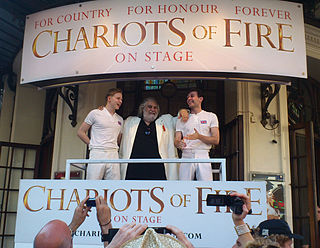
Vangelis was a Greek musician, composer, and producer. He began his music career in the 1960s with the Greek progressive rock band Aphrodite's Child and in the 1970s began composing electronic music. He gained wide mainstream popularity after composing soundtracks to film Chariots of Fire (1981) and Blade Runner (1982). His solo career discography consists of 23 studio albums, 26 compilation albums, 12 soundtrack albums, and roughly 29 singles. The majority of his film, documentary, theatre, and ballet & dance scores weren't released or officially released. He also collaborated with Jon Anderson and as a duo Jon and Vangelis released 4 studio albums, 2 compilations, and 13 singles, and with Irene Papas released two studio albums.

L'Enfant Sauvage is the fifth studio album and major label debut by French heavy metal band Gojira. It was released 26 June 2012 via Roadrunner Records.

Blade Runner 2049 – Original Motion Picture Soundtrack is the soundtrack album for the 2017 film Blade Runner 2049. Released in October 2017, the album contains music composed by Hans Zimmer and Benjamin Wallfisch, along with additional tracks by Elvis Presley, Frank Sinatra and Lauren Daigle. The soundtrack was produced by Michael Hodges, Kayla Morrison and Ashley Culp. It also includes the piece "Tears in the Rain", which was originally composed and performed by Vangelis, the composer of the original 1982 soundtrack Blade Runner.

Nocturne: The Piano Album is a studio album by Greek musician and composer Vangelis, released on 25 January 2019 on Decca Records. It is a solo piano album of 11 new tracks plus arrangements of various songs from his solo career.
